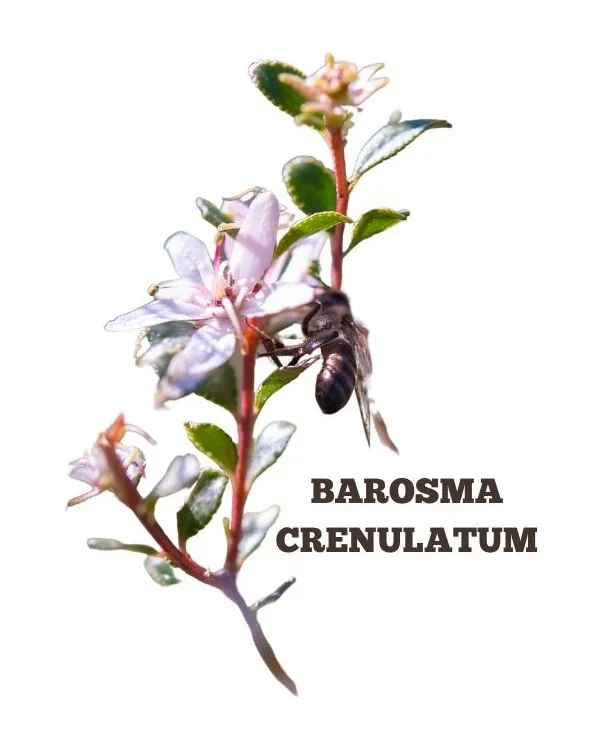Barosma Crenulatum, commonly known as Buchu, is a medicinal plant has been valued for its therapeutic properties for centuries because its specific effects on the genitourinary system make it a popular remedy for conditions such as irritable bladder, vesical catarrh, prostatic disorders, urinary gravel, and leucorrhoea.
In this detailed guide, we explore the source information, key characteristics, organ symptoms, relationship with other remedies, and dosage recommendations for Buchu.

Table of Contents
ToggleSOURCE INFORMATION
Scientific Classification
- Kingdom: Plantae
- Order: Lamiales
- Family: Rutaceae
- Genus: Barosma
- Species: Barosma crenulatum
Origin
- Barosma crenulatum, commonly known as Buchu, is a medicinal plant native to South Africa, particularly the Western Cape region.
- It grows abundantly in the fynbos biome and is cultivated for its therapeutic properties.
Historical Facts
- Buchu has a long history of traditional use among the indigenous Khoisan people of South Africa, who brewed it into a tea for various medicinal purposes.
- European settlers later adopted its use, and it became a popular remedy in 19th-century Western herbal medicine for urinary and reproductive system disorders.
Are not you interested in a very interesting history of medicine, here is a detailed post on HISTORY OF MEDICINE just a click away.
DRUG PATHOGENESIS
- Barosma crenulatum exerts marked specific effects on the genitourinary system, particularly in conditions involving muco-purulent discharges.
- It is indicated for an irritable bladder associated with vesical catarrh, as well as various prostatic disorders.
- Buchu is beneficial for conditions such as gravel (urinary calculi) and leucorrhoea (vaginal discharge).
KEY CHARACTERISTICS
- Specific effects on the genitourinary system: Buchu, or Barosma Crenulatum, exhibits distinct therapeutic effects on the genitourinary system, particularly in cases characterized by muco-purulent discharges.
- Addresses symptoms of an irritable bladder and vesical catarrh: It is beneficial for conditions involving an irritable bladder and inflammation of the bladder lining, known as vesical catarrh. Buchu helps alleviate associated discomfort and symptoms.
- Effective for prostatic disorders, gravel, and leucorrhoea: Buchu demonstrates efficacy in managing various prostatic disorders, urinary gravel (urinary calculi), and leucorrhoea, providing relief from these conditions.
- Genitourinary System: Buchu is indicated for addressing symptoms such as an irritable bladder, characterized by frequent urination and discomfort; vesical catarrh, which involves inflammation and increased mucus secretion in the bladder; prostatic disorders, including inflammation or enlargement of the prostate gland; and gravel, referring to the formation of urinary calculi or stones.
- Female Reproductive System: In the female reproductive system, Buchu is beneficial for managing leucorrhoea, which involves abnormal vaginal discharge characterized by its colour and consistency. It helps restore the natural balance and alleviate discomfort associated with this condition.
RELATIONSHIP WITH OTHER REMEDIES
Compare
- Copaiva: For urinary complaints with muco-purulent discharges.
- Thuja: For genitourinary disorders and prostatic issues.
- Populus: In conditions involving the urinary system.
- Chimaphila: For urinary gravel and vesical catarrh.
- Diosma: Additional comparison reference for related therapeutic effects.
DOSE
- Administer Buchu as a tincture or in the form of tea made from its leaves.
- Dosage should be determined based on the individual’s specific condition and the practitioner’s recommendations.
Frequently Asked Questions
What is Buchu, and where does it originate?
- Buchu, scientifically known as Barosma Crenulatum, is a medicinal plant native to the Western Cape region of South Africa.
- It has a long history of traditional use among the indigenous Khoisan people for various medicinal purposes.
What are the key characteristics of Buchu?
- Buchu exhibits specific effects on the genitourinary system, particularly in cases involving muco-purulent discharges.
- It addresses symptoms of irritable bladder, vesical catarrh, prostatic disorders, gravel, and leucorrhoea.
How is Buchu administered?
- Buchu can be administered as a tincture or in the form of tea made from its leaves.
- The dosage should be determined based on the individual’s specific condition and the recommendations of a qualified practitioner.
What are some other remedies similar to Buchu?
- Buchu can be compared to remedies such as Copaiva, Thuja, Populus, Chimaphila, and Diosma, which share therapeutic effects on the genitourinary system.
Meaning of Difficult Words
- Muco-purulent: Referring to a discharge containing both mucus and pus.
- Vesical Catarrh: Inflammation of the bladder characterized by increased mucus secretion.
- Prostatic Disorders: Conditions affecting the prostate gland, such as inflammation or enlargement.
- Gravel: Another term for urinary calculi or stones.
- Leucorrhoea: Abnormal vaginal discharge, typically whitish or yellowish in colour.
